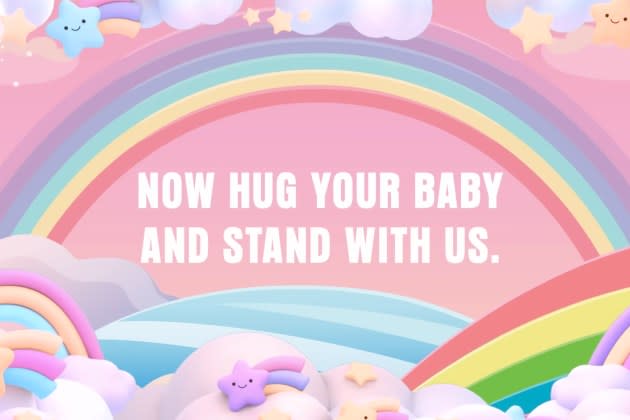Israel Runs Graphic Social Media Ads to Rally Support for Gaza Siege

Winged unicorns dance to a slow lullaby across a pink field of rainbows, cotton candy clouds, and smiling pastel stars. Black text interrupts the scene. “40 INFANTS WERE MURDERED IN ISRAEL BY THE HAMAS TERRORISTS (ISIS). JUST AS YOU WOULD DO EVERYTHING FOR YOUR CHILD. WE WILL DO EVERYTHING TO PROTECT OURS.”
“NOW HUG YOUR BABY AND STAND WITH US.”
The video, from the Israeli Ministry of Foreign Affairs, is one of several advertisements and promoted social media posts produced by Israel’s government to gin up support for their ongoing offensive against Gaza.
Last week, Hamas militants broke out of the Gaza Strip and launched a horrific attack against Israeli citizens living near the blockaded Palestinian territory, killing more than 1,400 people, many of them unarmed civilians. In response to the attack, Israel has launched a scorched-earth offensive against Gaza, cutting off food, water, and basic utilities to the territory, which is home to more than 2 million people, almost half of them children. Nearly 3,000 Palestinians have been killed and thousands of others injured. The United Nations now warns that the situation in Gaza is quickly devolving into a humanitarian catastrophe.
Israel’s digital campaign to win over public support includes a series of graphic ads targeted toward Americans and Europeans.
Genuinely in awe that Israel is airing this ad on youtube videos pic.twitter.com/9QyV6F04VT
— Denims (@DenimsTV) October 9, 2023
Social media users have reported seeing the ads on sites like YouTube and X (formerly Twitter), as well as on popular mobile phone games and mobile apps. A review of data available on Google’s Ad Transparency Center found that since Oct. 9, the Israeli Ministry of Foreign Affairs has taken out at least 45 ads through Google, YouTube’s parent company. It is not possible at this time to ascertain how many people have been served the ads, as Google has a 90-day wait period for impression metrics, but other social media metrics point to the amount of attention they’re getting.
On the Israeli Ministry of Foreign Affairs’ YouTube page, many of the advertisements have been reuploaded for public view. As of Tuesday morning, the ad styled to look like a children’s cartoon has garnered over 1 million views. Another ad featuring the Israeli death toll in the ongoing conflict has racked up more than 3 million views. Dozens of other videos, many of them featuring extremely graphic imagery, have been uploaded to the ministry’s page and garnered tens of thousands of views.
On X, the official account for the State of Israel has paid to promote posts depicting the devastation of Hamas’ attacks, testimony from the family members of victims, claims about on-the-ground operations in Gaza, and even images of dead infants as ads. The posts have collectively garnered millions of impressions.
X responded to a request for comment from Rolling Stone with a message indicating that they were “busy” and to “check back later.” A representative from Google noted that the company’s ad policy prohibits advertisements with political content or references to death from being served to kids or on videos aimed at children. Google clarified that the ad stylized as a children’s cartoon had been “appropriately labeled and is not serving on made for kids content or YouTube kids.”
On the ground in Gaza, internet connectivity has plummeted due to a combination of infrastructure destruction by Israeli bombing campaigns, and rapidly diminishing access to electricity and fuel following Israel’s resource blockade against the territory.
In contrast to Israel’s widespread paid digital presence, social media companies have been accused of suppressing Palestinian or pro-Palestinian voices expressing opposition to Israel’s retaliation against civilians in the Gaza Strip, which has been under an intense military blockade by Israel and Egypt since 2014.
On Monday, Meta, the parent company of Facebook and Instagram, responded to accusations it was suppressing pro-Palestinian content by claiming the issue had been related to a bug that “affected accounts equally around the globe and had nothing to do with the subject matter of the content — and we fixed it as quickly as possible.”
This story was updated at 7:05 PM on October 17, 2023, to include additional comment from Google.
More from Rolling Stone
Verified Accounts on Musk's X Spread 74 Percent of Israel-Hamas War Misinformation
President Biden Condemns Islamophobia, Killing of 6-Year-Old Palestinian-American Boy
MAGA Influencers Tearing Each Other Apart Over Israel-Hamas War
Best of Rolling Stone

